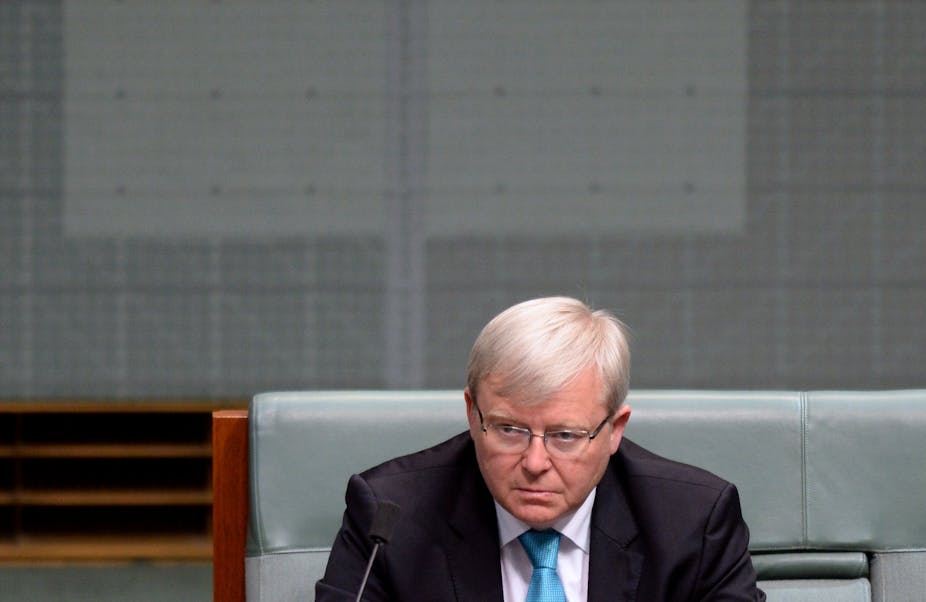Should we care about Kevin Rudd’s legacy? Will anyone care?
Australian political historians gaze with envy at the United States, where past presidents are revered and books about the “founding fathers” and past presidents are the American equivalent of our torrent of Anzac histories. Americans have the gallery of past presidents at Mount Rushmore. By contrast, we have the Australian War Memorial.
Historians have done their best to encourage reverence for past prime ministers, but voters have proven stubbornly resistant. John Howard talked much more about the Anzacs than he did about Robert Menzies. Kevin Rudd will leave a legacy, but it will be an uncertain and contested one – just as his future plans are.
Until World War Two, Australian prime ministers were overshadowed by powerful state governments and the British Empire. The war transformed prime ministers into national leaders and made them objects of historical memory. John Curtin was sanctified by martyrdom to the war cause, and the memory of Ben Chifley was rallying point for the divided and dispirited Labor Party of the Menzies years.

The legacy of Robert Menzies was shaped by the last years of his prime ministership, when he began to seem a man out of his time. Bob Hawke’s fate was similar. He dominated the 1980s: an era of strong unions, high inflation and the centrality of economic policy to political debate. But when this era passed, he seemed to have little to offer.
Gough Whitlam, Paul Keating and John Howard have had more enduring legacies. They came to encapsulate political style as much as policy: dogged progressivism (Whitlam and Keating) or tenacious conservatism (Howard).
Rudd’s popular appeal has been wide but shallow, as the rapid decline of his support during the 2013 election campaign demonstrated. As political blogger Greg Jericho has argued, Rudd’s appeal – unlike that of Julia Gillard - was to voters disinterested or hostile to “politics”. Rudd will have a smaller cadre of supporters to defend his legacy than will Gillard.
Rudd’s first prime ministership was defined by the global financial crisis, but he – like many to his Left – tended to assume that the crisis of neoliberalism would have a major political legacy. This was not the case, and the political salience of “debt and deficit” remained largely unchanged even as Liberals eventually adopted a budgetary policy little different from that of Labor.
Farewelling Rudd on the floor of federal parliament, prime minister Tony Abbott praised his predecessor for the apology to Indigenous Australians. The apology paved way for the consolidation of a new bi-partisan approach on Indigenous affairs. Under Rudd, the so-called “history wars” seemingly ended, but so also did the optimistic hopes the parliamentary Left once placed in Indigenous self-determination.
Rudd’s support for marriage equality in 2013 was a significant breakthrough. If the apology ended the history wars, Rudd’s commitment marked the beginning of the end of the marriage wars.
The asylum seeker debate in 2010 left a legacy almost as poisonous for Labor as that of the 2001 Tampa crisis. The perceived failure of Rudd’s 2008 humanitarian turn in asylum seeker policy emboldened the opposition and put Labor on the defensive. The parliamentary defeat of the Carbon Pollution Reduction Scheme owed much to the overreach of the Greens, but it also demonstrated Rudd’s political ineptitude.

Rudd’s legacy may lie less in the content than the style of his politics, despite the shambolic fate of the “New Way” election slogan in the 2013 campaign. Some on the Left saw Rudd’s “anti-politics” stance as new, but his style followed the example of the “ordinary populism” that state Labor governments of the early 2000s had adopted. This formula eventually expired at the state level, but it was particularly ill-suited to national politics.
As a result, Rudd, on his return to the prime ministership in June this year, had to deliver more than just his earlier post-partisan gestures – such as as the 2020 Summit and the appointment of ex-Coalition MPs (such as Tim Fischer) to overseas positions.
And as such, party reform became Rudd’s crusade. The participation of members in the selection of the party leader realised the hopes of generations of Labor reformers. The divisions and acrimony that his presence wrought among Labor MPs also weakened the hold of the ideal of caucus solidarity. Labor parliamentarians may in the future be able to vote independently of a caucus majority: this would be a major change.
Will Rudd be able to shape his legacy? He leaves parliament at age 56. Hawke left at 63; Keating at 52; Whitlam at 62. Hawke embarked on frenzy of now-forgotten activity and rushed to print with an unrevealing memoir. Both Whitlam and Keating sought instead to defend their policy legacy: Whitlam’s The Whitlam Government and Keating’s Engagement strived for impersonality in print.
Like Hawke, Rudd will be concerned to vindicate himself personally, and so an unreflexive memoir may be the outcome. Julia Gillard will probably find a niche, perhaps a more exalted version of the NGO leadership positions that some former state Labor premiers (such as Anna Bligh) have come to occupy.
Rudd will find a future role more difficult. He is neither a policy intellectual nor a great manager, as his former colleagues have queued up since the election to make public. He was a figure ill-suited to the process of Australian politics. But his popularity – like that of John Howard – reflected the exhaustion of old political narratives. His future role is as uncertain as that of the party he once led.

